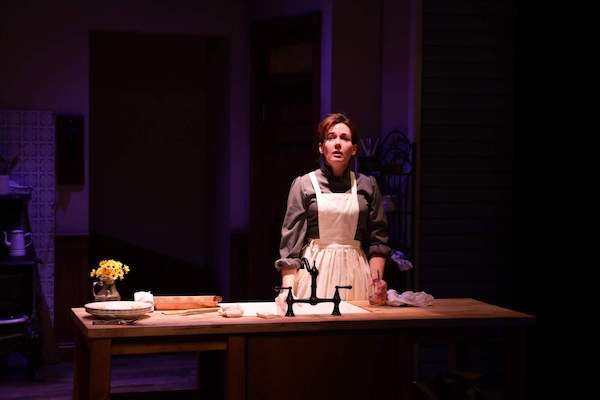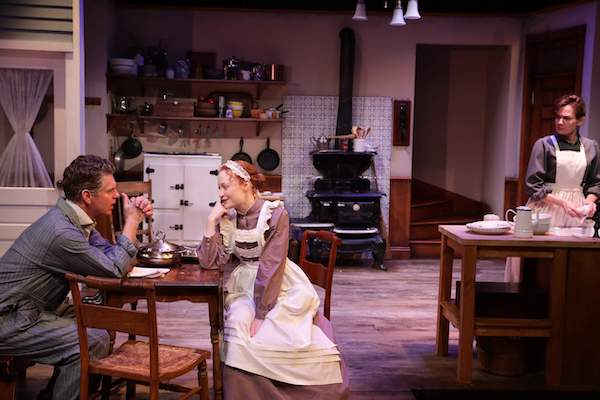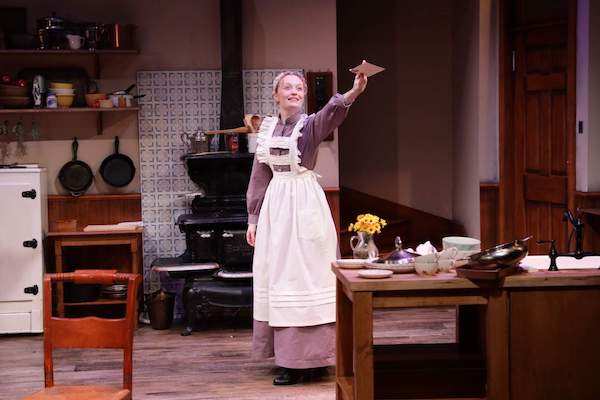Theater Review: “Thirst” — In the Shadow of Greatness
By David Greenham
The weight of the masterpiece on the other side of the kitchen door is ever-present, and it casts a smothering shadow on this lighter drama.
Thirst by Ronán Noone. Directed by Courtney O’Connor. Scenic design, Janie E. Howland, costume design, Mikayla Reid, lighting design, Karen Perlow, sound design, David Remedios. Produced by Lyric Stage, Clarendon Street, Boston, through March 17.

Aimee Doherty (Bridget) in Thirst at the Lyric Stage Company. Photo: Mark S. Howard
Avid Boston playgoers may remember the Huntington Theater Company’s 2015 premiere of Ronán Noone’s The Second Girl. Fast forward nearly a decade: after several rewrites and a celebrated 2022 production at Vermont’s Dorset Theater Festival, the drama, now retitled Thirst, is receiving a second chance in Boston at the Lyric Stage.
The script is a heartfelt project for the Irish born Noone, who teaches at the Walnut School for the Arts and is an adjunct assistant professor at Boston University’s MFA Playwriting program. He explains why in a 2023 New Hibernia Review article: “The bridging of two worlds, Ireland and America, was something I had been trying to construct creatively for quite a while. But I was unable to find a way to bring them together cohesively until I picked up Long Day’s Journey into Night.”
As a partner play to Eugene O’Neill’s famous 1956 Pulitzer prize–winning tragedy, Thirst is set in the kitchen in the Tyrone family’s oceanfront summer home on the same hot August day in 1912. The play offers a juxtaposition of sorts — an intimately domestic story and its fiercely explosive neighbor.
In the living room, the well-to-do Tyrones, led by larger-than-life James, are self-destructing; on the other side of the swinging kitchen door, a trio of servants dream of a better life.
Cathleen (Kate Fitzgerald), referred to as the “second girl” in O’Neill’s stage directions, is the only character who appears in both plays. Much of what goes on in Thirst is a fantasy set adjacent to O’Neill’s epic showdown. Noone has clearly done extensive research, so this drama about the underclass is clearly meant to illuminate aspects of the immigrant experience that remain relevant today.
Although Cathleen appears only briefly at the top of Act 3 in the source material, Noone has given the figure a backstory. She’s an Irish immigrant who has been in the US since April. (In a bold — if somewhat curious — twist, Cathleen is one of a very few immigrants to survive the sinking of the Titanic.)

Michael Kaye (Jack), Kate Fitzgerald (Cathleen) and Aimee Doherty (Bridget) in Thirst at the Lyric Stage Company. Photo: Mark S. Howard
Thirst also includes two other characters who are mentioned in O’Neill’s script. Noone invests some depth into these figures. Bridget (Aimee Doherty) is the cook, also from Ireland, and she carries with her a tale of sorrow from her homeland. Jack Smyth (Michael Kaye) is a garage assistant James Tyrone has hired to be Mary’s chauffeur. At one point in O’Neill’s script, Mary announces that she believes Smyth is purposely damaging the car to provide work for the garage. Smyth’s backstory in Thirst posits that the man was down and out. Bridget has cared for him and helped him recover and find a job.
Thirst runs a little over two hours with an intermission and it begins the night before O’Neill’s drama. Jack is providing gentlemanly assistance to Bridget, who’s drunk and flirty. The next morning a severely hungover Mary prepares the breakfast that the Tyrones will eat just before the start of their long journey into combative bitterness, sorrow, and misery.
Cathleen, bright and optimistic, dreams of one day heading to New York to become an actress. Playwright Noone says in his program notes that he found inspiration in Chekhov’s works. Cathleen shares some of Nina’s headstrong determination in The Seagull.
As a character, Jack Smyth is not well developed, partly because the action of the play takes place in the Tyrone family kitchen, where the guy serves no real purpose — beyond pining for Bridget and hoping for a chance to eat some leftovers. Although he’s not an immigrant, his circumstances are meager; Jack is stuck on the lowest rungs of the ladder of the American dream. He imagines a new and better life awaits if he can move west. But Jack doesn’t want to go alone.
It’s really Bridget’s story that anchors Thirst, and she’s the most stuck of all. Depressed and hopeless enough to dampen her sorrow through alcohol, she seems headed down the same path as the embittered James Tyrone. She didn’t immigrate to embrace the American dream but to escape an Irish nightmare. She’s searching for a better life — but isn’t convinced it’s possible.
In the program, director (and Lyric producing artistic director) Courtney O’Connor shares her own family history of immigration from Ireland. She obviously relates to the sensibilities of Bridget and Cathleen. The staging is simple and effective, with an emphasis on highlighting each character as they reveal their past and imagine a more fulfilling life.

Kate Fitzgerald (Cathleen) in Thirst at the Lyric Stage Company. Photo: Mark S. Howard
Scenic designer Jamie E. Howland’s useful period kitchen fills the Lyric’s cozy stage. There’s even a working stove. (The smell of cooking bacon may be tempting for some hungry audience members.) Mikayla Reid’s costumes are delightful, especially the women’s clothes in the second act, and Karen Perlow’s lights, while sometimes a bit intrusive, effectively follow the play’s characters as the long day eases into night. Perhaps the most interesting theatrical enhancement is David Remedios’s sound design: an appropriately melancholy tone is set through gently crashing waves, seagull squawks, and some elegant piano music.
Michael Kaye supplies a steady, if sometimes underplayed, Jack. We hear his story of loss, but seldom see the hurt that has surely settled deep inside of the character somewhere. Aimee Doherty’s Bridget gives a wavering performance. Sliding back and forth between misery and self-confidence, Doherty is at her best when she puts a cynical twinkle in her eye. Bridget’s drinking is self-evidently challenging but not, apparently, to Jack.
Kate Fitzgerald’s Cathleen breathes life into the production. The character is energetic and quick-witted, fearless yet fragile. Her story is the most compelling of the trio’s: it’s fun to see her step up into her role as “server,” energetically carrying a tray through the kitchen door as she enters the other play. Strangely, though, the trauma of her experience as a survivor of the Titanic has left no psychological marks.
The immigrant experience is a hot topic on stages these days and this script fits the fashion. When Cathleen and Bridget discuss their plight, including how they are being mistreated and underpaid, it strikes a relevant chord. “We’re immigrants,” says Cathleen, “being taken advantage of is our middle feckin’ name!”
The production has several involving sections, particularly when Noone digs more deeply into the characters. But the weight of the masterpiece on the other side of the kitchen door is ever-present and it casts a smothering shadow on this lighter drama. Despite the script’s earnest efforts to illuminate the hopes and hopelessness of early 20th-century immigrants (and a broken local who loves one of them), Thirst often comes off as a dutiful academic exercise.
David Greenham is an adjunct lecturer on Drama at the University of Maine at Augusta, and is the former executive director of the Maine Arts Commission. He has been a theater artist and arts administrator in Maine for more than 30 years.
Tagged: Aimee Doherty, Courtney O’Connor, Kate Fitzgerald, Lyric stage company of boston, Michael Kaye, Ronan-Noone
